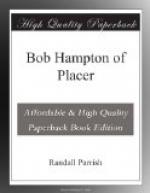CHAPTER VIII
A LAST REVOLT
It proved a restless day, and a sufficiently unpleasant one, for Mr. Hampton. For a number of years he had been diligently training himself in the school of cynicism, endeavoring to persuade himself that he did not in the least care what others thought, nor how his own career ended; impelling himself to constant recklessness in life and thought. He had thus successfully built up a wall between the present and that past which long haunted his lonely moments, and had finally decided that it was hermetically sealed. Yet now, this odd chit of a girl, this waif whom he had plucked from the jaws of death, had overturned this carefully constructed barrier as if it had been originally built of mere cardboard, and he was compelled again to see himself, loathe himself, just as he had in those past years.
Everything had been changed by her sudden entrance into his life, everything except those unfortunate conditions which still bound him helpless. He looked upon the world no longer through his cool, gray eyes, but out of her darker ones, and the prospect appeared gloomy enough. He thought it all over again and again, dwelling in reawakened memory upon details long hidden within the secret recesses of his brain, yet so little came from this searching survey that the result left him no plan for the future. He had wandered too far away from home; the path leading back was long ago overgrown with weeds, and could not now be retraced. One thing he grasped clearly,—the girl should be given her chance; nothing in his life must ever again soil her or lower her ideals. Mrs. Herndon was right, and he realized it; neither his presence nor his money were fit to influence her future. He swore between his clinched teeth, his face grown haggard. The sun’s rays bridged the slowly darkening valley with cords of red gold, and the man pulled himself to his feet by gripping the root of a tree. He realized that he had been sitting there for hours, and that he was hungry.
Down beneath, amid the fast awakening noise and bustle of early evening, the long discipline of the gambler reasserted itself—he got back his nerve. It was Bob Hampton, cool, resourceful, sarcastic of speech, quick of temper, who greeted the loungers about the hotel, and who sat, with his back to the wall, in the little dining-room, watchful of all others present. And it was Bob Hampton who strolled carelessly out upon the darkened porch an hour later, leaving a roar of laughter behind him, and an enemy as well. Little he cared for that, however, in his present mood, and he stood there, amid the black shadows, looking contemptuously down upon the stream of coatless humanity trooping past on pleasure bent, the blue smoke circling his head, his gray eyes glowing half angrily. Suddenly he leaned forward, clutching the rail in quick surprise.
“Kid,” he exclaimed, harshly, “what does this mean? What are you doing alone here?”




